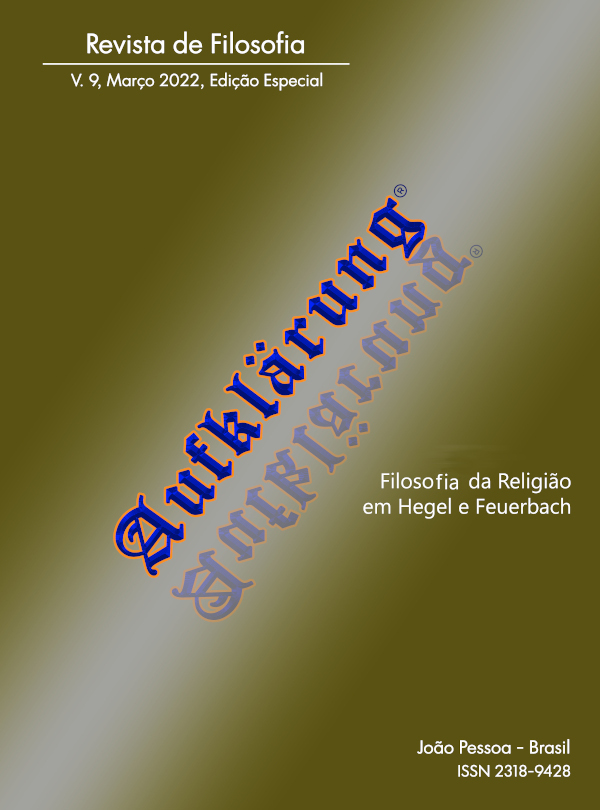The contradiction between good and evil in human essence and reconciliation in the philosophy of the hegelian religion
DOI:
https://doi.org/10.18012/arf.v9iesp.61926Keywords:
Philosophy of Religion, Duality Good and Evil , Contradiction and Reconciliation, Reform and RevolutionAbstract
The research explains the contradiction between good and evil subsisting in the human essence in the natural/spiritual duality, and, at the same time, the reconciliation proposed by Hegel in his Philosophy of Religion when dealing with consummate religion. What is the Hegelian strategy for resolving the contradiction implicit in human duality? It is a matter of explaining the logic of abstract freedom enclosed in being for oneself and the logic of the supersumption of evil in the divine concept of reconciliation. First, the opposition in the human essence is reconstructed through the narrative of the fall described in the book of Genesis; then, the overcoming of this opposition in the incarnation of the Son of God that brings about reconciliation through the singularity of the divine spirit and intersubjective objectivity in the community; finally, we point out the criticisms of the Hegelian Philosophy of Religion in post-Hegelian philosophy and theology, in which Marx's metaphysical-religious roots in the criticism of Hegel and religion remain, at the same time. We highlight the Marxian conception of the human being as a natural-spiritual essence that is primarily concerned with their material reproductive needs, that is, a liberated society takes care of the material bases of human life. Only then does the working human being find reconciliation in society. Updating the philosophy of religion debate is a challenge to face the growing religious fundamentalism that legitimizes human irrationalities and delays in civilizational achievements at all levels.
Downloads
References
DWORKIN, Ronald. Religion without God (2013)/Religion ohne Gott. Berlim: Suhrkamp, 2014.
HABERMAS, Jürgen. Auch eine Geschichte der Philosophie. Band 1: Die okzidentale Konstellation von Glauben und Wissen. Band 2: Vernünftige Freiheit. Spuren des Diskurses über Glauben und Wissen. Berlin: Suhrkamp, 2019.
HEGEL, G.W.F. Das Leben Jesu (A vida de Jesus). In: Frühe Schriften I. Friedrich Nicolin, Gisela Schüler. Gesammelte Werke (GW) 01. Hamburg: Meiner, 1989.
HEGEL, G.W.F. Filosofía de la religión. Trad. Ricardo Ferrara. Madrid: Editorial Trotta, 2018.
HEGEL, G.W.F. Lectures on the Philosophy of Religion: The Lectures of 1827, One-volume edition. Translated by R. F. Brown, P. C. Hodgson, J. M. Stewart. Berkeley: University of California Press, 1988.
HEGEL, G.W.F. Doutrina do Ser. Petrópolis: Vozes, 2016.
HEGEL, G.W.F. Filosofia do Direito. Editora Loyola/Unisinos: São Paulo, 2010.
HEGEL, G.W.F. Vorlesungen über die Philosophie der Religion II, Theorie-Werkausgabe Suhrkamp Bd. 17, E. Moldenhauer, K. M. Michel (Orgs.), Frankfurt am Main, 1986.
HEGEL, G.W.F. Pänomenologie des Geistes, Theorie-Werkausgabe Bd. 3, E. Moldenhauer, K.M. Michel (Orgs), Frankfurt am Main: Suhrkamp, 2014.
HEGEL, G.W.F. Enciclopédia das Ciências Filosóficas. V. I, São Paulo: Loyola, 1995.
HEGEL, G.W.F. Enciclopédia das Ciências Filosóficas. V. III, São Paulo: Loyola, 1995.
HÖSLE, Vittorio: Hegels System. Der Idealismus der Subjektivität und das Problem der Intersubjektivität. 2 Bd., Hamburg: Meiner, p. 638-662, 1987.
HÖSLE, Vittorio: God als Reason. Essays in Philosophical Theology. Indiana: University of Notre Dame Press, 2013.
HÖSLE, Vittorio: Gott als Vernunft, Berlin: Metzler, 2021.
IBER, Christian. Sobre religião, Estado e sociedade em Marx com uma olhada na Filosofia do Direito de Hegel. In: Filosofia do direito e contemporaneidade [recurso eletrônico]. Leno Danner, Marcus Vinícius Xavier (Orgs.). Porto Alegre: Editora Fi, p. 256-279, 2015.
IBER, Christian. A transformção da doutrina hegeliana da oposição e da contradição por Marx. Revista Dialectus, Fortaleza. Orgs. Antonio Dias, Renato Almeida de Oliveira. No prelo.
KÜNG, Hans. Die Menschwerdung Gottes. Eine Einführung in Hegels theologisches Denken als Prolegomena zu einer künftigen Christologie. Freiburg, Basel, Wien: Herder, 1970.
LÖWITH, Karl. Von Hegel zu Nietzsche. Der revolutionäre Bruch im Denken des neunzehnten Jahrhundert. (De Hegel a Nietzsche. A ruptura revolucionária do pensar do século dezenove), Hamburg: Meiner, 1995.
MOLTMANN, Jürgen. Theologie der Hoffnung. Untersuchungen zur Begründung und zu den Konsequenzen einer christlichen Eschatologie. (Teologia da Esperança. Estudos sobre a justificação e as conseqüências de uma escatologia cristã). Gütersloh: Gütersloher Verlagshaus, 2005, (Erstauflage 1964).
THEUNISSEN, Michael. Hegels Lehre vom absoluten Geist als theologisch-politischer Traktat, Berlin: De Gruyter, 1970.
Additional Files
Published
How to Cite
Issue
Section
License

This work is licensed under a Creative Commons Attribution 4.0 International License.
Journal general policy
1.This journal works under a Creative Commons License aplied to online journals. That icence can be read in the following link: Creative Commons Attribution 4.0 International (CC BY 4.0).
2.Accordingly to this License, a)the journal declares that authors hold the copyright of their articles without restrictions, and they can archieve them as post-print elsewhere. b)the journal allow the author(s) to retain publishing rights without restrictions.
Metadata Policy for information describing items in the repository
1. Anyone may access the metadata free of charge at anytime.
2.The metadata may be re-used in any medium without prior permission, even commercial purposes provided the OAI Identifier or a link to the original metadata record are given, under the terms of a CC BY license refered for the Journal.







































